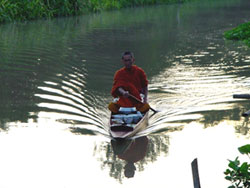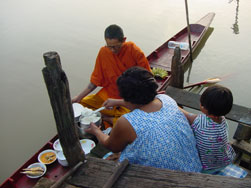

 |
 |
|
Tradition
of making merit |
||
|
Making merit means doing good things as mentioned in religious doctrine. Thais ways of life, since their birth until their death is so familiar with making merit. They strongly believe they ought to regularly make and gain merit which would bring them happiness, peaceful life and other good things. Gaining merit will strengthen them to overcome any obstacles or misfortune they are suffering. They intend to gain more merit because they also believe their accumulated merit would help them to be in heaven or a peaceful place after their death. Even more merit they gained would help them to reach nirvana (divine peace beyond this world). Thais belief is based on the Buddhist doctrine. The concept is as stated in a Thai proverb if you do good you will receive good; if you do evil you will receive evil . It means the result of Karma which represents the evaluation of all life events, that is, you will receive the outcome of what you have already initiated. A common rule in making merit is to prepare ones mind and thoughts.The mind has to be purified and ready. Gaining merit, however, must not bring any trouble or worry to oneself or others. There are three ways of making and gaining merit. They are 1) to give alms 2) to maintain religious commandment, and 3) to pray If all of these are perfectly met, it represents a great merit making. But most of people see that making merit is to give alms. That is partly true because it is the first step of a fully-gained merit. On this occasion only alms giving will be expressed as it is a very common Thais way of life. Making merit by putting food in the bowl of monks.
This tradition means putting food into the monks bowl. Monks receive alms from people who believe they are gaining merit by giving. Every morning around 6.00 am - 7.00 am, monks silently pacing the streets to receive offerings. It is understood that this is an opportunity for people to gain merit.
Foods offered to monks are well prepared. Newly cooked rice, various kinds of savory, sweet and fruits. Some people may prepare flowers, joss sticks and candles. When the monk arrive, people will ask them to stop then they will place foods into the bowl monks are carrying. Flowers, joss sticks and candles are put on the metal lid of the bowl or into monks bag. Then they will get blessed. While monks are blessing, one should pour water which shows that they wish to devote the merits they gained with their relatives who have already passed away. This step concludes the rite of making merit by giving alms. Making merit by giving alms has been part of Thais lifestyle for thousands of years. It is mentioned in two parts of Buddha history. First, when Buddha just became enlightened, he went to stay at a milky tree. Merchants named Tabussah and Palikah passed by and deeply admired the prestige of Buddha. They gave their provision to Buddha. Buddha used his bowl to receive food offered. Second, when Buddha went to the forest of mango trees, Anupiya district, province of Makadha. He went about with a bowl to receive food. When he passed King Pimpisanas city of Rajgrah. The people in the city saw him doing this for the first time, So they brought food and put it into Buddhas bowl. It became tradition until present. So we can see monks and novices carrying bowl pace the streets every morning. We can also see all kinds of people are willing to make merit which is to give alms, giving food to monks and novices. Put on 5 March 2000 , last update 6 March 2003 |
|
||||||||||||||||||||